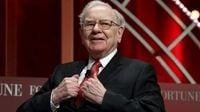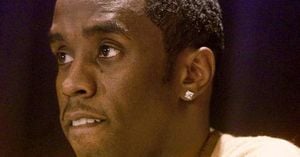In a historic announcement that has sent ripples through the investment world, Warren Buffett, the 94-year-old billionaire and CEO of Berkshire Hathaway, has declared he will step down from his role at the end of this year. This transition marks the end of an era for one of the most revered figures in finance, as Buffett hands over the reins to his long-time deputy, Greg Abel. The announcement was made during the annual shareholders' meeting in Omaha, where Buffett surprised attendees by revealing his plans after a lengthy Q&A session.
The Berkshire Hathaway board of directors is expected to convene on Sunday, May 4, 2025, to discuss the details surrounding this significant leadership transition. Investors are now keenly watching the markets for reactions as trading resumes on Monday.
While the news of Buffett's retirement was not entirely unexpected given his age, many in the investment community were taken aback. Buffett's presence has long been synonymous with Berkshire Hathaway, often described as the "Oracle of Omaha" for his uncanny ability to predict market trends. Investor Mark Malik from Siebert.NXT noted, "There has always been a premium on Berkshire's stock due to Buffett's name." This sentiment reflects the deep-rooted trust and confidence investors have placed in Buffett over the decades.
As Abel prepares to take over, investors express mixed feelings. Though many have confidence in Abel, who has served as Vice President for several years and has overseen Berkshire's non-insurance companies since 2018, there are concerns about his lack of the charisma and historical presence that Buffett has cultivated. Abel hinted at a desire to be "more active" in managing subsidiary companies while maintaining a significant degree of their independence—an essential aspect of Buffett's investment philosophy.
Speculation is rife that Abel's management style may differ from Buffett's, particularly regarding the pace at which he might divest from underperforming companies. Buffett himself began this process in 2019 when he sold Applied Underwriters, followed by the divestiture of local newspapers in 2020, famously stating that the newspaper industry "has become a thing of the past." However, making substantial changes in a company valued at approximately $1.16 trillion, with 189 operating companies and $264 billion in stock holdings, is no small feat.
Cathy Seifert, an analyst from CFRA, remarked that Abel will need to "walk on eggshells" as he balances maintaining Buffett's investment philosophy with making his own mark on the company. Buffett's approach to investing has always been philosophical, emphasizing long-term gains over short-term profits. Since taking charge of Berkshire in 1965, he has delivered shareholders an average annual return that has consistently outperformed the S&P 500.
Buffett's legacy is characterized by his unique investment strategy, which he has described as a simple formula for wealth-building. He has often emphasized that wealth does not come quickly but through patience and a deep understanding of the companies one invests in. His commitment to reinvesting profits rather than paying dividends has been a hallmark of his strategy, with Berkshire not issuing dividends since 1967.
The annual shareholders' meeting, often dubbed the "Woodstock for Capitalists," has attracted tens of thousands of investors from around the globe, serving as a platform for Buffett to share his insights and engage with shareholders. It remains uncertain whether this tradition will continue at the same scale without Buffett at the helm, as he has always regarded the event as an opportunity to connect with individuals who share a similar ethical compass.
Despite the uncertainty surrounding this leadership change, many investors continue to view Berkshire Hathaway as a bastion of discipline, operational independence, and long-term vision. However, the absence of the legendary figure who has embodied these values for decades will undoubtedly test the company's resilience in a rapidly evolving market landscape.
Buffett's unique approach to investing has been shaped by his life experiences and the era in which he has operated. His success is attributed not only to his keen analytical skills but also to his unwavering dedication to the stock market. Since buying his first share at the age of 11, Buffett has immersed himself in financial data, often humorously described as a "magician with stocks." He has read more than 100,000 financial statements throughout his career, a feat that underscores his extraordinary memory and understanding of market patterns.
Buffett's insights have been honed over decades, and his ability to identify investment opportunities in overlooked sectors has set him apart from other investors. For instance, his early investments in companies like Dempster Mill and Sanborn Map showcased his knack for recognizing potential where others saw risk. His consistent annual returns of 25.3% from 1957 to 1968 starkly contrasted with the S&P 500's 10.5% during the same period, highlighting his exceptional talent.
Moreover, Buffett's unique investment framework, which eschews traditional management fees and performance incentives, has allowed him to pursue opportunities without the pressures faced by most investment managers. Berkshire Hathaway operates as a conservative holding company, encompassing a diverse portfolio of stocks, bonds, and private companies, while maintaining over $334 billion in cash.
As Buffett prepares to pass the torch, the investment community is left to ponder the future of Berkshire Hathaway without its iconic leader. The company has thrived under Buffett's stewardship, and his departure raises questions about its ability to maintain its status as a symbol of intelligent investing in a world where change is the only constant. The coming months will reveal how Greg Abel navigates this intricate landscape and whether he can uphold the legacy of a man who has defined investment success for generations.




